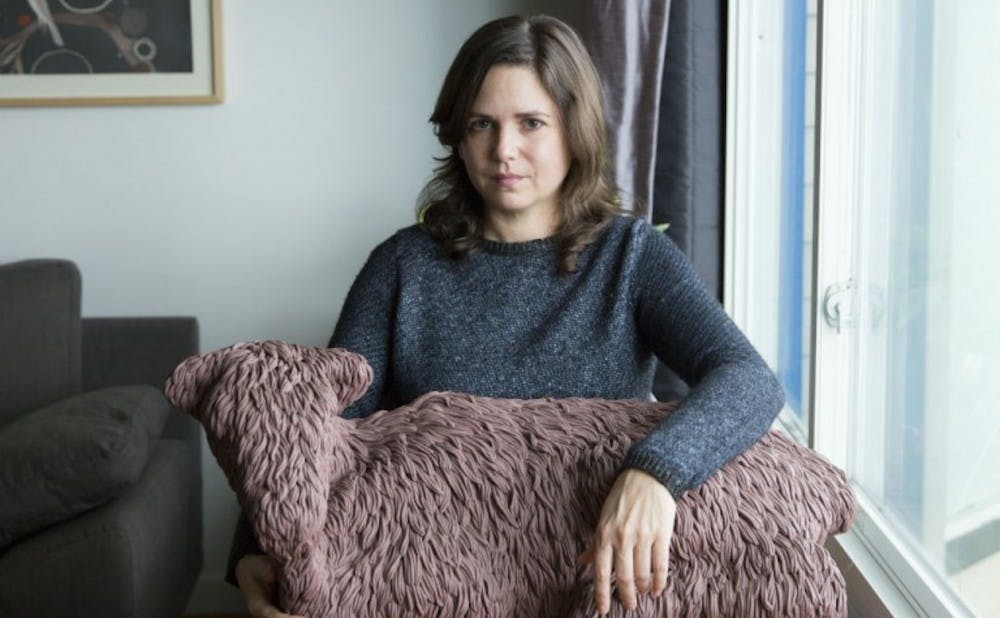Lucy Corin, Trinity ’92, is a writer and visiting professor of English at Duke, as well as professor of English at the University of California at Davis. She has published two collections of short stories, “One Hundred Apocalypses and Other Apocalypses” and “The Entire Predicament" and one novel, “Everyday Psychokillers: A History for Girls." She is currently working on her second novel. The Chronicle spoke with Corin about her writing and what writing has shaped her.
The Chronicle: Many college students are trying to figure out their way after graduation. How did you become a writer?
Lucy Corin: There’s a million ways to answer that. I grew up in a house full of books where I was really encouraged to do things and make things, and where writing was a way to get out of chores by being in the middle of a project. As long as you were doing something or making something, that was good with my parents. We didn’t have a television but if you were just sitting around you would have been set to some productive task, like cleaning things.
TC: Who were the authors who shaped you during your youth?
LC: Our house was filled with books, but they were books for grown-ups. There were some things for kids, but they were all mixed together. So I was reading the children’s versions of fairytales right along with MAD Magazine, Jim Carroll’s “Basketball Diaries” and James Dickey poems. My mom was a Shakespeare scholar and she was mostly interested in the history, so I got a lot of stories about British aristocracy as bedtime stories.
TC: You graduated from Duke in 1992. What has changed since you were a student?
LC: It’s hard to tell what has changed about Duke and what has changed about universities in general, in terms of culture and what students are focused on. Yet, as I walked into the new Bryan Center, it was so beautiful to see that the first thing to your right is that office for queer students and students of color. When I was here, the offices for these organizations were tiny rooms buried in the basement that you would never see. I really did get a little weepy seeing how open and celebratory these groups are treated now. Also, I’m pretty excited about the way they’ve shifted housing, which seems to be a lot better than it was when I was an undergraduate.
TC: Were you an English major?
LC: I was, but I wasn’t at first. I came in as a drama major, as there was a really exciting theater program that was starting up at the time — but what I learned from investing myself in it from my first year on, was that I didn’t want to be an actress. I’m a terrible memorizer, so I was never on stage without being in complete terror about even the most basic things, like forgetting where you have to go. Then I realized that I was most attracted to the storytelling, so when I finally took my first creative writing class and saw that there was a way you could organize your life around it, that changed everything.
TC: After graduating from Duke, you got an MFA from Brown University. In the last few years, these programs have been somewhat controversial, with some critics arguing that they isolate writers and make them too distant from everyday life. How has that experience changed you?
LC: I’ve heard that critique and it’s one of at least a dozen similar claims. I’m not sure about all of them, but I just don’t think there’s anything wrong with finding some funding and a supportive culture that says, “Sit here and think about writing for a couple of years!” We are in a culture that devalues the arts and where it’s practically impossible to support yourself and actually have time to do anything creative. An MFA allows you to test out what you are as an artist and what it means to you, in an intense, 24/7 culture that you just can’t find anywhere else. Still, it can hurt writers if they mistake that culture for every culture.
TC: You published two collections of short stories, a genre which Stephen King once said was barely alive anymore. How do you choose your genres?
LC: Well, I guess it depends on what parties you go to whether you think the short story is dead or not. That kind of perspective is the same kind of view of the world that would say poetry and theater are dead, which would mean that only mass culture matters — but subculture matters and quirky culture matters, as well as underground culture matters. I would say the short story is doing pretty great, with some of them being up for the National Book Award, although that’s not what makes it alive. I think what makes it alive is whether there are people who dedicate their life to it.
TC: Of the last 10 to 15 years, what works of art and media have been your favorites?
LC: A book would be Horatio Castellanos Moya’s “Dance with Snakes.” I watch a lot of longform series TV, which I’m very interested in and the reality TV shows that have been going on for 20 years. Except I won’t watch “Big Brother.” I think it’s unbearable, but I’m very interested in the evolution of “Survivor” or “The Bachelor,” for example. Especially them establishing a narrative and individuals taking on roles as characters relates to the novel and what things are possible for the novel.
Get The Chronicle straight to your inbox
Sign up for our weekly newsletter. Cancel at any time.

